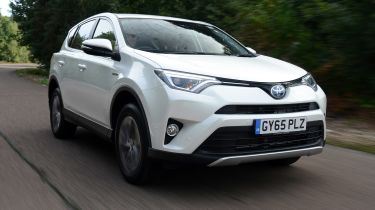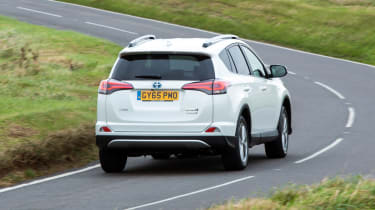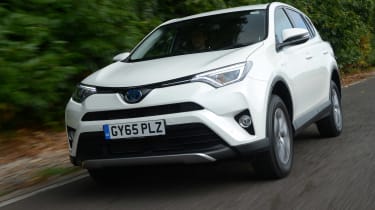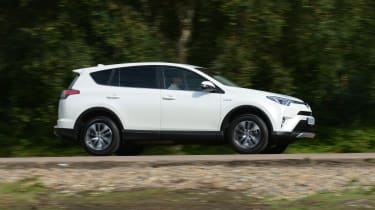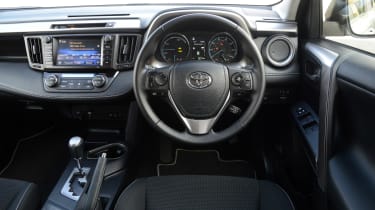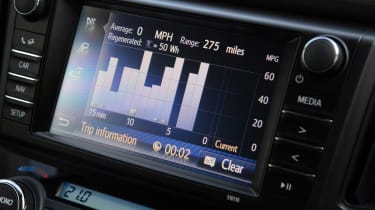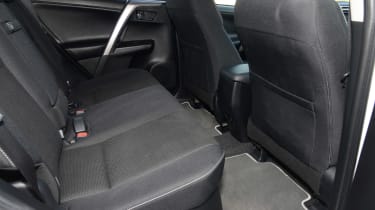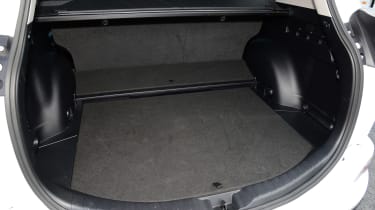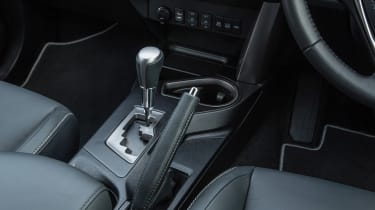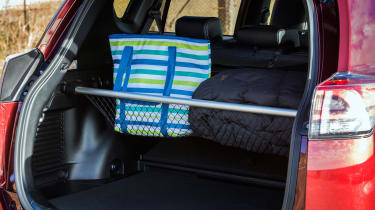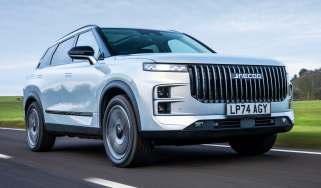Toyota RAV4 Hybrid review (2013-2018)
“The Toyota RAV4 Hybrid is practical and safe, but its small battery puts it at a serious disadvantage next to plug-in hybrid SUVs”
Pros
- Comfortable interior
- Safe and reliable
- Practical boot
Cons
- Dull to drive
- Noisy petrol engine
- Average running costs
Toyota has been at the forefront of hybrid technology for two decades, but we’ve had to wait a long time for the Toyota RAV4 Hybrid SUV. The reason is possibly its larger size, requiring Toyota to adapt the technology from its upmarket Lexus NX to propel the RAV4.
This means its 2.5-litre petrol engine is quite a bit bigger than the 1.8-litre found in the Toyota Prius and Toyota C-HR, resulting in lower fuel economy. The RAV4 Hybrid also struggles in comparison with plug-in hybrid SUVs like the Mitsubishi Outlander PHEV and MINI Countryman Cooper S E ALL4, because its small battery is far smaller.
 Toyota RAV4 review – a sensible hybrid SUV with a long warranty
Toyota RAV4 review – a sensible hybrid SUV with a long warranty
Front and four-wheel-drive versions of the Toyota manage official fuel-economy figures of just over 55mpg, while the Outlander and Countryman achieve well over 130mpg in laboratory tests. Such high figures are possible because both competitors boast an all-electric range of more than 20 miles when charged from the grid, while the RAV4 can only harness enough energy for around a mile of zero-emissions driving.
Contrary to impressive on-paper specifications, the RAV4 doesn’t really impress on the road either. The CVT automatic gearbox causes the engine to sit at high revs if you squeeze the throttle, masking the 195bhp produced by its petrol and electric motors and 8.4-second 0-62mph acceleration.
More reviews
Performance, handling ride comfort are all affected by the 175kg weight penalty from its extra mechanical parts, with more body lean and less grip in corners. Energy recuperation means the brakes also feel less natural to use than the petrol or diesel RAV4. The smaller Toyota C-HR is considerably more fun to drive and the MINI is in a different league.
Aside from these failings, the RAV4 is still a practical family car, with plenty of room for people and their paraphernalia in the functional interior. Materials look more upmarket than in the Outlander PHEV, even if the dashboard design is very conservative.
Its boot is a good size – even after a slight reduction to accommodate the battery pack – and the four-wheel-drive model is also adept at towing, with a 1,650kg braked trailer limit.
The Toyota RAV4 finished fourth out of the 75 cars ranked in our 2017 Driver Power owner satisfaction survey of cars currently on sale in the UK. Its five-star Euro NCAP score should also be a draw for families.
MPG, running costs & CO2
The RAV4 hybrid comes with a choice of front or four-wheel drive, affecting potential economy slightly, but not by as much as you might think. The former is most efficient, returning up to 57.6mpg, while the latter can still manage 55.4mpg. Similarly, CO2 emissions increase from 115 to 118g/km, but that’s not a big enough change to severely affect running costs.
Company-car drivers are likely to be attracted by the hybrid badge, but the RAV4’s emissions only qualify it for the 22% Benefit-in-Kind (BiK) band, which is some way off the 17% of the Kia Niro hybrid and 9% achieved by the MINI Cooper Countryman S E ALL4 plug-in hybrid.
The RAV4 can be driven for around a mile on electricity alone using its 1.6kWh nickel-metal-hydride battery pack, before the petrol engine comes to life. When it’s depleted, energy recuperated from braking and power from the engine gradually replenishes charge.
After the first year's CO2-based road tax (generally included in the on-the-road price), all Toyota RAV4 Hybrids cost £130 a year to tax. The RAV4 is available with Toyota Safety Sense – a suite of safety technology that reduces your chance of being in a collision. We mention it here because it has a significant impact on insurance groups, which start from 27 with it fitted and 32 without. These are quite high groups for a small family-friendly SUV, with most versions of the Nissan Qashqai and SEAT Ateca sitting in groups lower than 20.
Toyota offers fixed-price servicing plans which you can pay for in one go or by spreading the payments over a number of months. An intermediate service costs around £180, while a full service is just over £330.
Engines, drive & performance
Toyota has fitted a 2.5-litre petrol engine that powers the front wheels through a continuously variable transmission (CVT) and will be familiar to owners of the Lexus NX. Combined with an electric motor, it has 195bhp, but it never feels like the most powerful model in the RAV4 range. Put your foot down and the revs climb, while there’s a drone from the engine as the transmission meters out power, but acceleration is mediocre, especially if you need to pick up speed on the motorway.
The 0-62mph figure of 8.4 seconds looks quite promising on paper, but the RAV4 feels slower in normal driving conditions, especially when compared to the brisk plug-in hybrid MINI Countryman. The four-wheel-drive hybrid RAV4 has the same overall power, but differs in that it gets an extra electric motor at the rear, sending its 68bhp to just the back wheels. It’s certainly not intended for serious off-roading, but can help out with traction as you pull away in slippery conditions.
Four-wheel drive doesn’t make it anymore fun to drive, because every RAV4 Hybrid is plagued by vague steering, brakes that have an inconsistent feel and the added weight of its battery and electric motors. Quite unlike the Countryman PHEV, the Toyota feels more at home around town and soon loses grip when faced with tight corners.
Interior & comfort
Once the RAV4 Hybrid settles to a cruise, it’s much quieter and more relaxed inside, but hills and bursts of acceleration will cause the engine to cause a racket again. At low speeds in car parks and around town, the electric motor can provide near-silent running, but you’ll need to be gentle with the throttle to keep the petrol engine from cutting in.
The chunky tyres and raised ride height offer reasonable ride comfort most of the time, but again the extra 175kg of weight can be felt, because the Hybrid RAV4 transmits the impact from deep potholes through your seat far more than the petrol or diesel version.
There’s plenty of scope to adjust the driver’s seat and steering wheel to accommodate people of all shapes and sizes and the interior appears robust, if not very stylish. It remains true to Toyota’s reputation for functional dashboards, with old-fashioned-looking switches and lots of black plastic – although the Toyota C-HR is far better in this regard. Everything is logical, just not very exciting, including the aftermarket-looking sat-nav screen.
Trim levels include Business Edition Plus for the front-wheel-drive Hybrid or the more expensive Icon and Excel trims with four-wheel drive. Business Edition Plus gets energy-saving LED headlights and exterior bulbs, a powered tailgate and keyless entry as well as a standard reversing camera. Icon trims add 18-inch alloy wheels, leather and Alcantara upholstery, heated front seats and an enhanced infotainment system with sat nav. For more luxury, Excel adds full leather upholstery, roof rails and all-round parking sensors.
While it used to only be available with higher trim levels, from October 2017 the RAV4 Hybrid is available across the range.
That update also brings with it a new set of trims, compirsing Icon, Icon Tech, Design and Excel.
Icon includes all the necessary bells and whistles, with keyless entry and go, a seven-inch infotainment system, a DAB radio, a reversing camera, a powered tailgate and dual-zone climate control.
Icon Tech adds sat nav to the infotainment system, while Design brings 18-inch black alloy wheels, LED headlights and heated seats upholstered in leather and Alcantara suede fabric. The top-spec Excel model comes with leather seats, voice recognition, blind spot warning system and a 3D upgrade for the sat nav.
Practicality & boot space
Unlike some hybrids, which lose interior space to make room for the battery pack, occupants should find it just as easy to get comfortable in the RAV4 Hybrid as the regular model. There’s plenty of space with four adults in tow and room for them to stow personal items in the many cubbyholes and door bins.
The batteries shrink the boot from 547 to 501 litres, but that’s still more than you’ll find in the Mitsubishi Outlander PHEV (463 litres) and almost 100 litres more space than the MINI Countryman PHEV. Fold the rear seats down and the RAV4 Hybrid has an impressive 1,633 litres of room for your belongings.
It’s a shame only the range-topper comes with roof rails, but they’re available with the exterior Style Pack. Fixed or detachable towbars are offered as accessories and anyone planning on using the RAV4 Hybrid for towing should strongly consider the four-wheel-drive version, which increases towing capacity from 800kg to 1,650kg. That’s the difference between being able to haul just a small trailer and a large caravan or horsebox.
Reliability & safety
Toyota has built up a good reputation for reliability over the years and the RAV4 was rated highly in this category in our 2017 Driver Power owner satisfaction survey of cars currently on sale in the UK. Of the owners who responded, just 6.25% reported experiencing a problem with their car at least once. Every new Toyota is sold with a five-year/100,000-mile warranty – that’s longer than the industry standard, even if it can’t quite compete with the Kia Niro’s seven-year cover period.
The RAV4 is pitched squarely at families, so its five-star Euro NCAP crash-test score is crucial to its success. The Toyota scored 89% in the adult occupant protection category and 82% for child occupant protection, which is a good result, even if it can’t compete with the Tiguan’s class-leading scores of 96% and 84%.
We’d say the Toyota Safety Sense is a £1,000 option you can’t afford to leave unticked. Not only does it have a big impact on the insurance group, the autonomous emergency braking can detect both obstacles and pedestrians in the road ahead.
Price, value for money & options
The entry-level Business Edition Plus version represents good value, coming in at just over £26,000. If you don’t plan on towing, it’s the best version to go for.
Costing around £30,000, the Icon and Excel versions of the RAV4 Hybrid are less compelling. If you can manage without the extra space, the MINI Countryman Cooper S E ALL4 has much better performance, lower running costs and a far more characterful interior.
Do note that from October 2017 Toyota no longer offers Business Edition Plus trim, meaning the cheapest RAV4 Hybrid is the front-wheel drive Icon model, which is around £29,000.
Options include exterior styling packs with side steps, extra chrome and roof rails for just under £1,000 and a Protection Plus pack, with mud flaps, scuff plates, bumper protection and a boot liner, for £350. Metallic paint costs around £550 while pearlescent shades are just under £800.
See how this car scored on our sister site DrivingElectric

